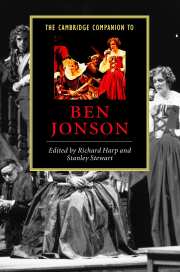Book contents
- Frontmatter
- 1 True relation
- 2 Jonson's London and its theatres
- 3 Jonson and the court
- 4 Ben Jonson and learning
- 5 Jonson's satiric styles
- 6 The major comedies
- 7 Jonson's late plays
- 8 Jonson and Shakespeare and the rhythm of verse
- 9 Jonson's poetry
- 10 Jonson and the arts
- 11 Ben Jonson's Folio of 1616
- 12 Jonson's classicism
- 13 Jonson's criticism
- 14 Jonson's critical heritage
- Bibliography
- Index
8 - Jonson and Shakespeare and the rhythm of verse
Published online by Cambridge University Press: 28 May 2006
- Frontmatter
- 1 True relation
- 2 Jonson's London and its theatres
- 3 Jonson and the court
- 4 Ben Jonson and learning
- 5 Jonson's satiric styles
- 6 The major comedies
- 7 Jonson's late plays
- 8 Jonson and Shakespeare and the rhythm of verse
- 9 Jonson's poetry
- 10 Jonson and the arts
- 11 Ben Jonson's Folio of 1616
- 12 Jonson's classicism
- 13 Jonson's criticism
- 14 Jonson's critical heritage
- Bibliography
- Index
Summary
John Dryden's confession that “I admire [Jonson], but I love Shakespeare” helped to establish the discourse for subsequent response to the two great figures of English Renaissance drama. The first assessment is intellectual, the second chiefly emotional, and for the next three centuries most readers and audiences endorsed these judgments and developed the critical conversation accordingly. Thus Jonson has usually been regarded as pedantic, classical, satiric, Shakespeare as natural, accessible, romantic. Actually the division began even earlier than Dryden, originating to some degree in Jonson's own stated and implicit articulation of the difference: he the scrupulous classicist, Poet, and disdainer of the “public riot,” Shakespeare the crowd-pleasing professional and fluent writer who (unfortunately) never blotted a line. Later critics accepted the comparative description but inverted the evaluation, preferring the work and persona of the natural genius to those of his crabbed competitor. For most of the twentieth century, scholarship agreed to observe a rigid critical segregation: Shakespeareans rarely devoted much attention to Jonson, while most Jonsonians sought to remove their subject from the shadow of the master. It is heartening to observe that recent critical trends, particularly the interrogation of canonicity and renewed interest in historicism, have encouraged simultaneous consideration and helped to identify some theatrical and thematic intersections between the men and their work.
- Type
- Chapter
- Information
- The Cambridge Companion to Ben Jonson , pp. 103 - 118Publisher: Cambridge University PressPrint publication year: 2000



